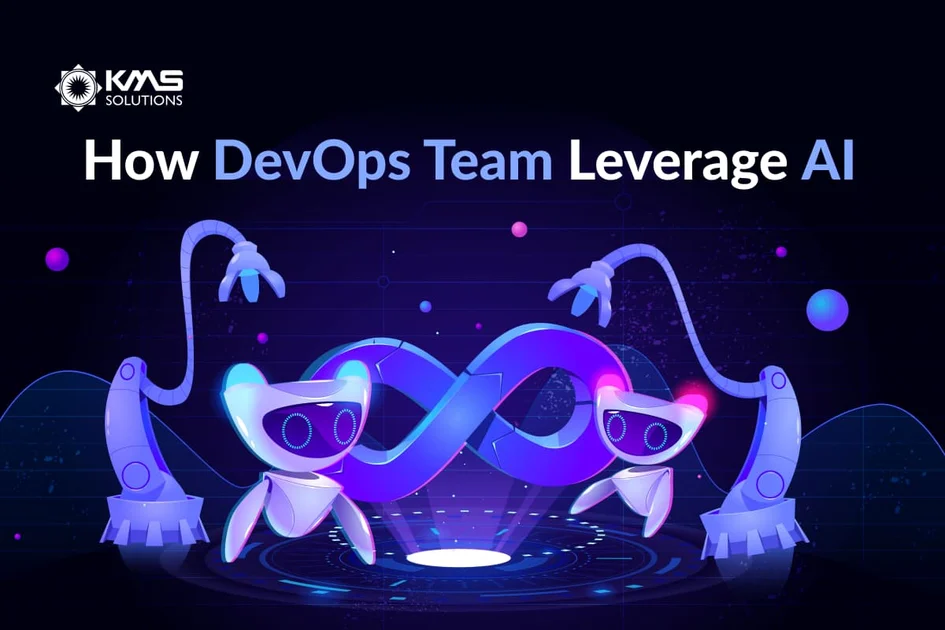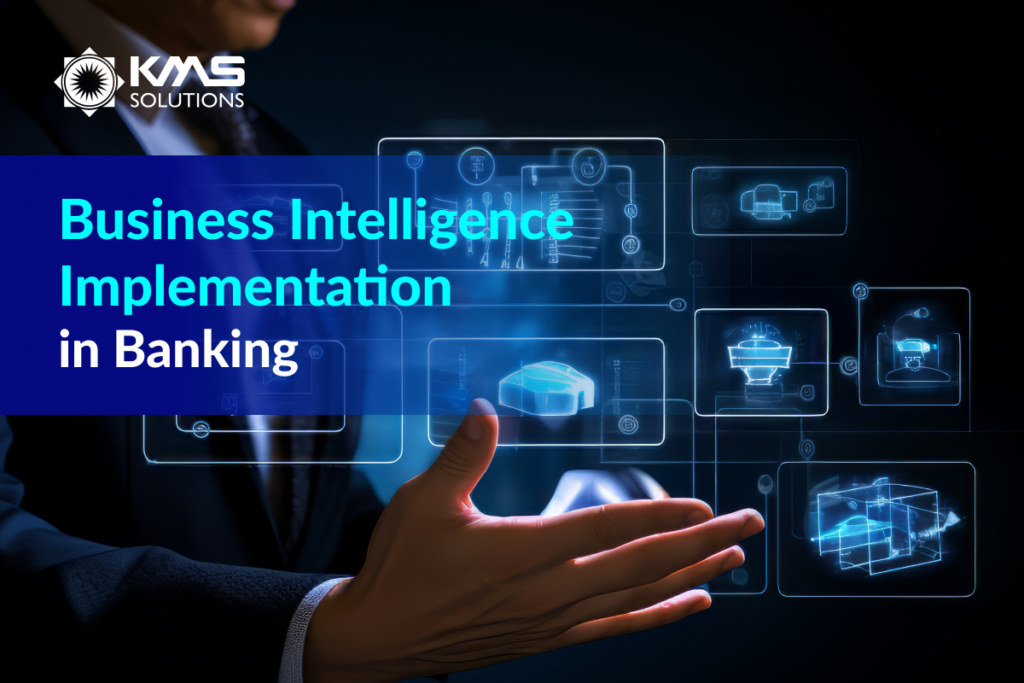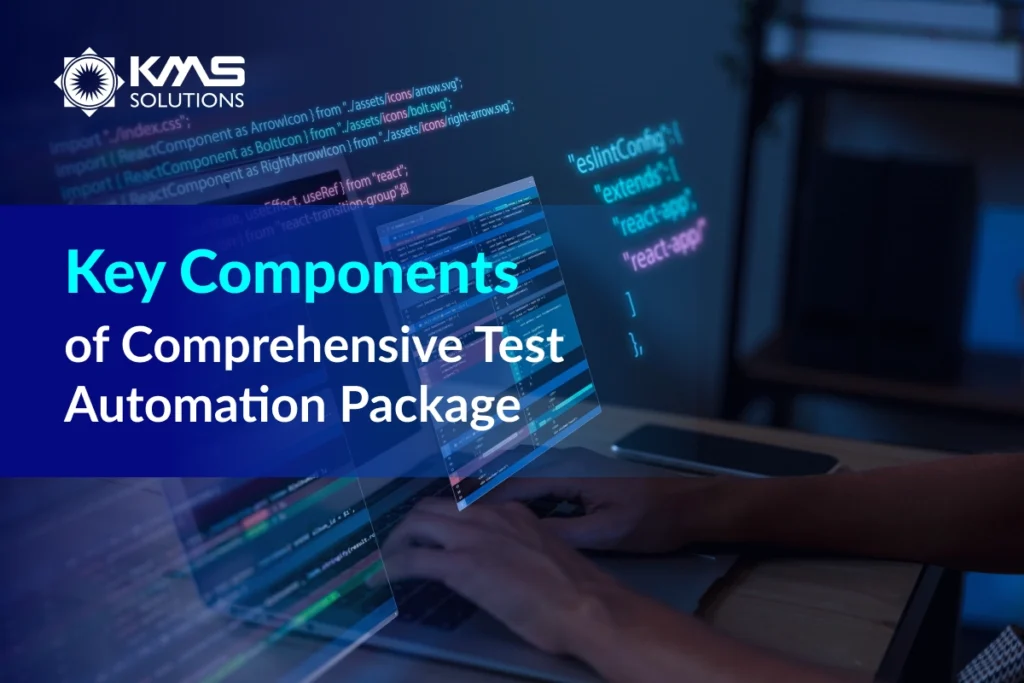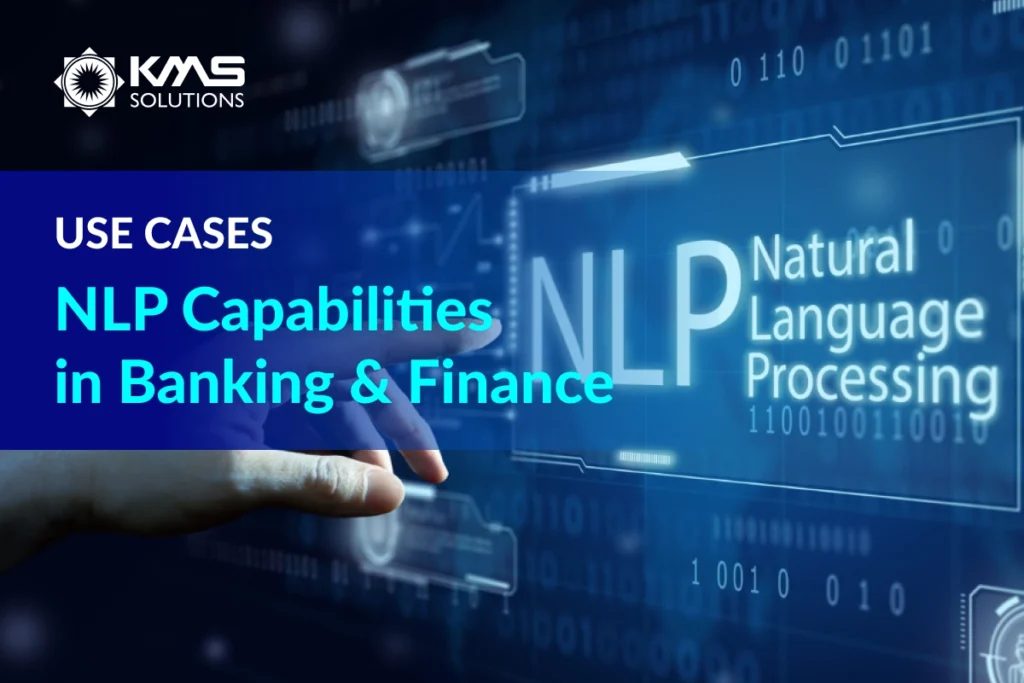The convergence of artificial intelligence (AI) and DevOps has ushered in a new era of software development. As per Gartner’s projection, by 2023, approximately 40% of DevOps teams are forecast to adopt application and infrastructure monitoring applications incorporating AI within their IT operations platforms.
Artificial Intelligence, with its ability to mimic human intelligence and learn from data, has found a natural fit within the DevOps ecosystem. It not only addresses the evolving needs of businesses but also augments the capabilities of DevOps teams, leading to improved software quality, faster time-to-market, and enhanced operational efficiency.
In this article, we will explore the inseparable connection between AI and DevOps and delve into how the DevOps team can leverage the power of this emerging technology.
AI, DevOps and The Combination
What is AI?
AI, or artificial intelligence, refers to the field of computer science that deals with the technology used to develop software systems capable of simulating human intelligence. AI systems are designed to perceive and understand their environment, reason and make decisions based on available information, learn from experience, and interact with humans and other machines.
In the BFSI sector, the application of AI is rising in popularity, transforming how financial institutions operate, interact with customers, and handle everyday transactions and monetary rules.
Read more: The CIO’s Guide: Implementing Generative AI in Financial Software Development
What is DevOps?
DevOps is an acronym that stands for development (dev) and operations (op). These two departments have been combined to improve production, speed, and security. DevOps team is the collaboration between software developers and operations teams that work together to automate processes, improve efficiency, and enhance the overall software development lifecycle.
DevOps’s Roles in the Age of AI
To maximize its effectiveness, DevOps relies on automation, and AI/ML is an ideal choice for handling repetitive tasks seamlessly.
Read more: Comprehensive Guide to Software Testing in DevOps Environments
When asking the DevOps team about common causes of software release delays, they were identified as manual, time-consuming, labour-intensive, and potentially error-prone activities, including software testing, code review, security testing, and code development. The adoption of AI/ML could prove indispensable for many teams by streamlining and simplifying these processes.
What Are the Benefits of AI in DevOps?
The integration of AI into DevOps processes offers a range of advantages that can significantly enhance the efficiency, reliability, and agility of software development and operations. Here are some key benefits:
- Enhanced Automation: AI-driven automation can handle repetitive and time-consuming tasks, such as code testing, deployment, and monitoring. This reduces the manual workload on DevOps teams, allowing them to focus on more strategic and creative aspects of development and operations.
- Improved Code Quality: AI can analyze code to identify potential bugs, vulnerabilities, and code quality issues before they become problems. Machine learning algorithms can learn from historical data to predict and prevent future issues, leading to more robust and secure code.
- Accelerated Development Cycles: AI helps speed up the development lifecycle by automating tasks like environment provisioning, configuration management, and deployment. This acceleration enables faster release cycles and quicker time-to-market for new features and updates.
- Scalability: AI systems can scale up or down based on the needs of the DevOps processes, ensuring that operations can handle varying loads without manual intervention. This scalability is crucial for managing the dynamic nature of modern applications and infrastructure.
How Does DevOps Team Benefit From AI?
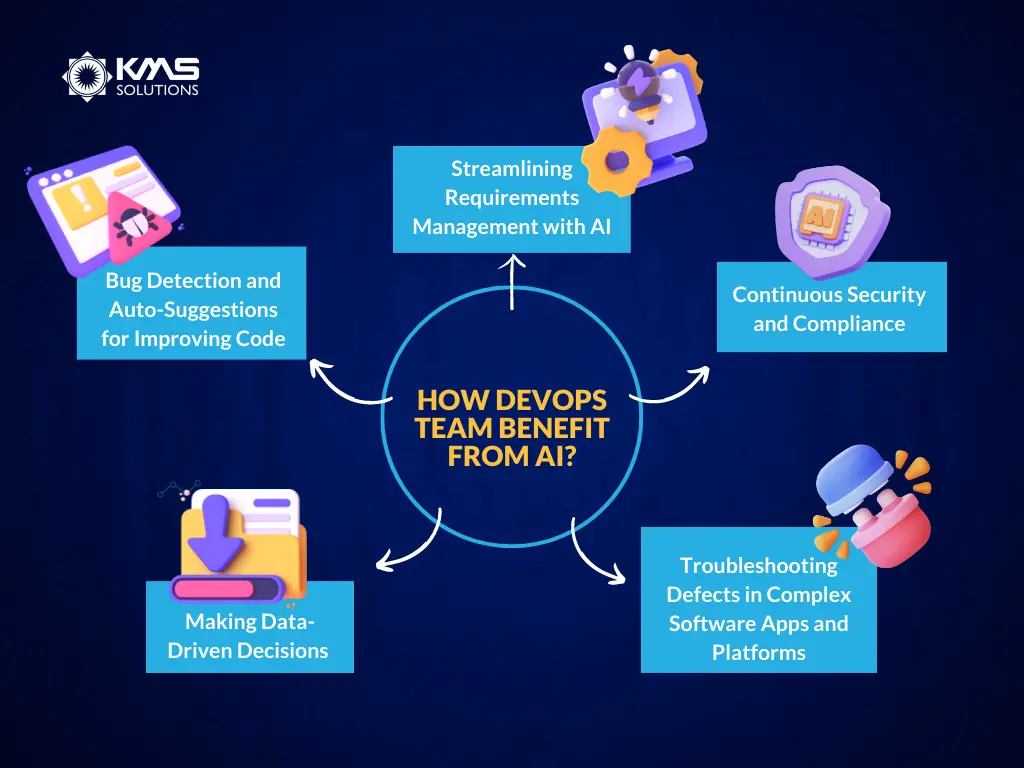
The combination of AI and DevOps has the potential to address and mitigate numerous challenges faced by DevOps teams. Here is how the DevOps team can take advantage of AI:
1. Bug Detection and Auto-Suggestions for Improving Code
At Facebook, a bug detection tool anticipates defects and proposes effective remedies that show an accuracy of approximately 80% of the time, with AI technology being trained to fix bugs automatically.
Semmle CodeQL is recognised as the leading AI-powered DevOps tool in this domain. DevOps teams using CodeQL can effectively identify vulnerabilities in code and detect logical variations across their entire codebase. Microsoft incorporates Semmle for vulnerability hunting, and its security response team utilises Semmle QL to uncover different manifestations of critical issues. This capability empowers them to swiftly address severe code problems and proactively prevent incidents.
2. Streamlining Requirements Management with AI
AI is successfully simplifying all stages of requirements document creation, editing, verifying, testing, and management. DevOps team members embrace AI and ML-driven requirements management platforms, allowing them to save time and re-concentrate on coding and software development, even when working under tight deadlines.
Accurately capturing requirements at the beginning is crucial for maintaining a project’s critical path within its designated timeline. Recognising this opportunity, providers of AI-powered software development tools are swiftly developing and introducing new applications in this domain, aiming to establish a compelling business case for keeping projects on schedule.
There is rapid adoption of Natural Language Processing techniques in this realm of DevOps tools, especially in enterprises; embracing AI-based tools has been shown to reduce requirements review times by over 50%.
3. Continuous Security and Compliance
Effectively enhancing security and compliance by generating and running test cases automatically tailored to the specific attributes of a given code base is another area where DevOps teams can take advantage of AI capabilities.
Here are some practices that corporations of all sizes can adopt to their DevTestOps strategies to continuously enhance software security as their operations change:
- Navigate to Autonomous Testing by integrating AI into the testing process: This help eliminates test coverage overlaps, optimise existing testing efforts with more predictable testing, and accelerate progress from defect detection to defect prevention.
- Automate quality gates: Automated quality gates facilitate CI/CD by automatically verifying whether a software component meets the necessary quality standards for deployment. This helps maintain a high level of software quality, accelerates the release cycle, and minimises the chances of releasing faulty or subpar software into production.
- Automate Compliance Requirements: Automated compliance tests play a crucial role in verifying that all requirements are fulfilled, and that features can be safely deployed to production. These tests can vary in complexity, ranging from comprehensive frameworks that automate infrastructure compliance to simple yet targeted test collections designed specifically for compliance checks.
4. Making Data-Driven Decisions
Becoming data-driven is quickly becoming part of the DevOps team’s DNA. AI can be harnessed within a DevOps team at a BFSI organisation to delve into the underlying causes behind certain transaction issues. Explore how Financial Institutions can adopt AI in their software development!
Moreover, DevOps develops a multitude of data that produces more issues for teams. AI algorithms can process and analyse vast amounts of structured and unstructured data, providing actionable, real-time insights and identifying patterns, trends, and anomalies. This enables DevOps teams in financial institutions to make informed decisions based on comprehensive data analysis.
To establish a data-driven decision-making culture in DevOps, adhere to the following steps:
- Harness existing data resources,
- Deliver data to the proper stakeholders automatically.
- Emphasise simple, data-driven solutions for cumulative impact.
- Consider the potential of DevOps
- Measure and evaluate DevOps progress through data-driven approaches.
5. Troubleshooting Defects in Complex Software Apps and Platforms
Enterprise software companies prioritize rigorous software QA processes to eliminate bugs, logic errors, and unreliable code segments. The objective is to avoid costly measures such as retrofitting releases or, in the worst-case scenario, recalling them.
AI-driven QA tools are demonstrating their efficacy in preemptively identifying potential failure points within enterprise applications, even before they are deployed in intricate customer environments.
The implementation of AI has proven successful in conducting root cause analysis and has significantly expedited the application delivery process for a prominent CRM provider, resulting in a remarkable 72% reduction in time-to-restore for customers’ enterprise environments, according to Deloitte’s report. Additionally, other DevOps team has harnessed AI to automatically configure application settings, optimizing performance specifically for customer deployments.
Success Stories of Practical AI Implementation
Here are notable instances of how the DevOps team can harness AI in their development process, showcasing the impact and benefits derived from AI integration and the lessons learned from practical implementations.
1. Google
Google employs AI within its CI/CD pipelines, specifically through its Cloud Build platform. Through its Cloud Build platform, AI algorithms are employed to perform various tasks and optimise the pipeline workflow. Here are a few ways Google leverages AI in CI/CD pipelines:
- Code Vulnerability Detection: AI algorithms analyze code repositories, scanning for potential vulnerabilities and security risks. By automatically identifying issues such as insecure coding practices or outdated dependencies, developers can address them promptly, ensuring the security of the software.
- Continuous Integration Optimization: Analyze code changes, identify dependencies, and determine the most efficient order for integration. This helps streamline the integration process, reducing conflicts and ensuring smooth collaboration among developers.
2. Netflix
As a leading streaming platform, Netflix heavily relies on DevOps approaches to provide a seamless experience to its users. In the full-cycle DevOps culture at Netflix, the team entrusted with constructing a service also assumes responsibility for deploying, testing, managing infrastructure, and operating that service.
AI has been adopted to use by Netflix to offer customers the greatest possible service and experience. Netflix utilises AI to personalise user recommendations by analysing their viewing habits and interests. This enables users to take control of their streaming experience and tailor their interactions with the platform.
Challenges of Adopting AI in DevOps
The integration of artificial intelligence (AI) in DevOps has the potential to revolutionise software development and delivery processes. However, this transformation is not without its challenges.
- Skilled Talent Acquisition: Finding and recruiting such talent can be a demanding task. Integrating AI technologies into existing DevOps workflows requires careful planning and coordination to ensure a seamless integration without disrupting ongoing operations.
- Integration and Workflow Alignment: Integrating AI technologies into existing DevOps workflows requires careful planning and coordination. Ensuring a smooth transition without disrupting ongoing operations is crucial. Organisations must assess their existing processes, identify areas where AI can bring value, and develop a well-defined roadmap for implementation.
- Shadow AI: Posing significant challenges to the adoption of AI in DevOps environments. When AI initiatives are implemented without proper oversight or integration into the DevOps process, it can create fragmentation and inconsistency within the organization.
How KMS Solutions Take Advantage of DevOps and AI
To remain competitive in the present and future landscape, it is essential to strategically employ artificial intelligence (AI) to drive efficiency, enhance security, and deliver superior products. Whether you seek a specialized DevOps team proficient in AI technology or assistance in equipping your existing DevOps team with AI capabilities, our team of experts at KMS Solutions is ready to support you. Contact us today to embark on this transformative journey.



